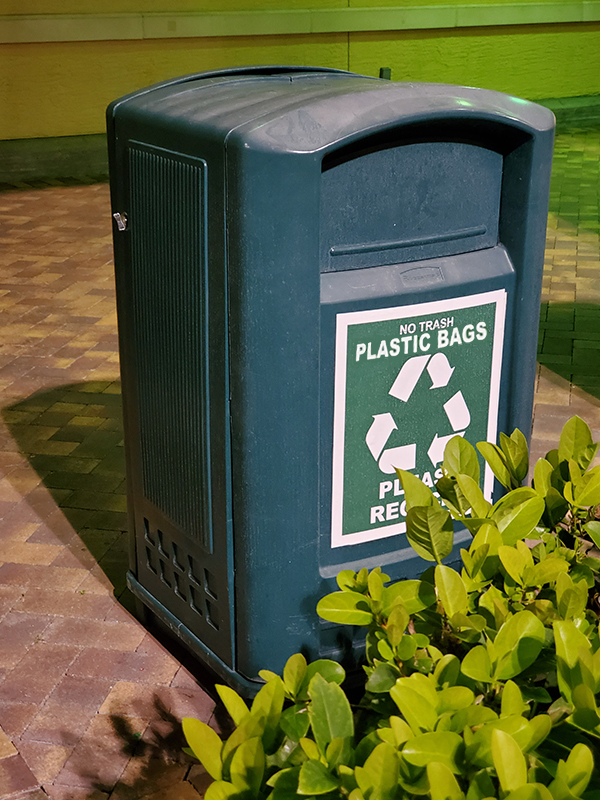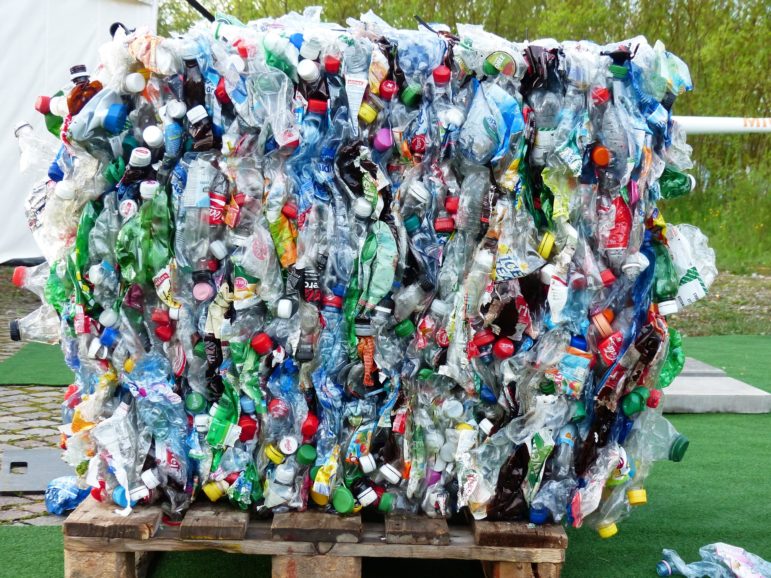TWH – The Environmental Protection Agency (EPA) reported the White House has proclaimed November 15 as “America’s Recycles Day.” In 1960, people recycled less than 7% of trash. By 2021, people recycled 32% of their trash. The recycling industry has generated 681,00 jobs that pay $37.8 billion in wages.
In honor of “America Recycles Day,” The Wild Hunt recently spoke via email with two researchers about their findings on the topic of recycling and the Pagan community. They have each researched the relationship between eco-friendly Pagan attitudes and behaviors.
Kristal Barrywood, a Ph.D. student at the University of Alberta, presented her research findings before a conference at the Harvard Divinity School. She gave her findings the title, “Understanding Environmentalism in Pagan Paths and its Effects on Altruism in Rituals.”
Manny Tejeda Moreno, Ph.D. is the editor-in-chief of The Wild Hunt and presented his findings in the Mystic South Conference academic track, Pagans and Polytheists Educational Research Symposium (PAPERS), and at the Covenant of the Goddess Leadership Institute. His presentation was, “A comparison of pro-environmental citizenship behaviors between members of Earth-based and monotheistic faiths.”
Solitaries lack access to resources
A reverence for nature forms a core Pagan belief. That reverence should lead to high levels of financial, activist, or personal involvement. Barrywood examined how Pagans expressed those pro-environmental attitudes in action.
Barrywood said she found a paradox: “The Pagan community is known to revere nature, and yet many are not doing any activism (monetary or time) towards environmental movements and/or non-profits.”
This paradox occurred most often among solitary Pagans and practitioners. Solitaries did not lack interest, they lacked information. Barrywood reported that solitaries “did not know where to look to support environmentalism.”
Pagans place a high value on their/our relationship with Nature. Yet, that value may not lead to the use of local eco-friendly, recyclable, or biodegradable ritual props, tools, or incense.
Barrywood argued that “the Pagan community does need to be a bit more cohesive in defining beliefs and offering knowledge.” She feels that this could improve access to “resources on where to support environmental movements, either globally or locally.”
Recycling and Ritual Objects
Rituals reflect the values of those doing the ritual. Barrywood argued that ritual organizers could differ in their values about recyclability from another Pagan. To the ritual planners, the intent behind the ritual object use could have more importance than an eco-friendly abstract value.

Ritual items – Image credit: Tracy Lundgren from Pixabay
Financial or transportation difficulties limit the choice of non-recyclable or biodegradable ritual objects. Barrywood suggested flexibility.
As an example, she said, “When one has to use a non-biodegradable object, try and reuse that item as many times as possible before throwing it out.”
Pagans could grow and harvest their own herbs rather than purchasing them. Someone else might buy “the most naturally sourced, handmade, blessed besom money can buy.”
In her practice, Barrywood has found that certain things work best for her. She grows her own plants. She buys from small businesses after researching their sources. She preferentially uses reusable items as much as possible.
Eco-friendly offerings
Some Pagans have argued that Pagans should limit all offerings to what cannot harm the local environment. Some offerings can harm animals, birds, and fish if they eat them. Others could contain the seeds of invasive species.
Note: This argument exemplifies Barrywood’s paradox. It criticizes people for their behavior without providing them the needed resources to change that behavior.
Barrywood argued that the best universal offering would be water. Any practitioner can infuse water with “energies/good vibes/spells/etc.” She suggested that people might make offerings of their own cut hair or nail clippings.
She asked, “What is more symbolic of honor/reverence than offering part of oneself?”
Barrywood provided suggestions for how to learn if a plant offering is native to a particular locale. A native plant will be eco-friendly to that ecosystem.
The National Wildlife Foundation has a Native Plant Finder for those within the U.S. The Canadian Wildlife Federation has a Native Plant Encyclopedia. Plantlife has a Plant and Fungi and County Flowers database for the U.K., Gardenia’s database includes native plants for the U.S., U.K., and Australia.”
Pagan values do not necessarily result in more pro-environmental activities
Moreno described recycling as “the process of converting waste materials into new materials and objects.” He said, “previous research has shown that recycling behavior does not come naturally to humans.”
Recycling requires a focus on long-term planning. Whereas humans tend to focus on short-term rewards.

Pagans, of course, place a high value on reverence for Nature. Moreno noted that many major Pagan organizations have issued “clear statements on environmental responsibility and the climate crisis.” Other Pagan organizations have embedded eco-friendly statements in their core belief statements.
He said the Pagan communities “do not have a uniform agreement on principles but general agreement on environmentalism and activism on behalf of the Earth.”
In the monotheistic traditions of Judaism, Christianity, and Islam, the physically manifested world is an expression of God. Moreno examined whether that difference caused Pagans to be more eco-friendly than those in the monotheistic traditions named above.
Monotheists, however, are not monolithic. Some denominations and traditions have adopted eco-friendly beliefs. Moreno reported that, “Monotheistic faiths view their role on Earth as stewards. All relationships are with God and all of nature is God’s creation. There is no relationship independent of God.”
Moreno referred to the Papal encyclical “Laudato si’ “( in English, “Praise Be to You),” as an example of how some traditions are addressing environmentalism. The Eastern Orthodox has designated September 1 as a day of prayer to protect the environment is another example. In Judaism, Moreno noted the religious imperative found in the Mishnah called Tikkum Olam (in English, “the repair of the world”) as a driver of environmental activism.
Moreno reported that, “The greatest inconsistency [in caring for Nature] is generally among Christian, Protestant Evangelicals.”
The sample
To examine this question, Moreno used a random sample of 292 respondents. The vast majority of the sample identified as White Non-Hispanic; minority groups accounted for less than 15%. Most had partners. Roughly 55% identified as female. About 45% of respondents identified with a monotheistic tradition. Another 55% identified with Pagan traditions.
Among monotheists about 25% identified as Catholic, 40% as Protestant, 20% as Jewish, and 10% as Muslim.
Among Pagan-identified respondents, 55% identified as Druids, and 20% as Wiccan. The rest identified as “a mix of different groups.” As this survey was a convenience sample, no one should generalize its results.
The results
The Pagan-identified respondents “reported higher levels of composting, conserving material, promoting environmentally friendly behaviors, participating in environmental events, and encouraging others to pay attention to climate issues.”
In contrast, the monotheistic identified respondents reported being more “attentive of conserving energy as well as (and very importantly) discussing with others about ways to become more environmentally friendly and suggesting to others how to reduce the amount material they use.”
Surprisingly, both Pagan-identified and monotheistic-identified respondents reported similar levels of recycling behavior.
Moreover, about 45% of respondents in each group reported no recycling behaviors. That figure suggests that Pagans do not engage in recycling any more frequently than those in the non-Pagans sample.
In additional analyses looking at specific denominational breakdowns, Moreno found that Catholic and Congregationalist respondents reported similar levels of recycling as Pagan-identified respondents.
Moreno noted that in his sample, none of the Evangelical respondents reported recycling behavior.
For information on recycling
 A recycling bin differs from a trash can. Recycling is an industrial process. Different recycling plants have different criteria for what they can accept. For that reason, people have to pre-sort their trash for the recycling industry to use it.
A recycling bin differs from a trash can. Recycling is an industrial process. Different recycling plants have different criteria for what they can accept. For that reason, people have to pre-sort their trash for the recycling industry to use it.
The EPA has reported that “plastic bags, electronics and batteries” should never go into a recycling bin. For information on how and where to recycle different items in the U.S., please visit, “How Do I Recycle?: Common Recyclables.”
The Wild Hunt is not responsible for links to external content.
To join a conversation on this post:
Visit our The Wild Hunt subreddit! Point your favorite browser to https://www.reddit.com/r/The_Wild_Hunt_News/, then click “JOIN”. Make sure to click the bell, too, to be notified of new articles posted to our subreddit.
